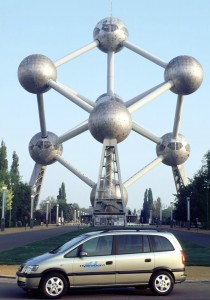General Motors Company’s board of directors was schedule to meet today for an update on the proposed deals to transfer control of its European operations, including Opel, to a group headed by Magna International or a private equity investment group called RHJI.
As TDB previously reported, the RHJI bid is a cleaner two-party deal. It is easier to implement and gives GM a larger share of the “new Opel.”
Opel is vital to GM’s future product development plans and it is clear that GM is reluctant to sell it to what is a Russian financed bid. Speculation has it that the Russians want control of Chevrolet in Russia, which is currently expanding globally at GM. The Opel and Chevrolet product lines compete directly in the types of small and medium-sized vehicles that are key in emerging markets such as Russia, Eastern European countries, as well as India and China.
Officials from Magna confirmed privately that its representatives and its Russian partner Sberbank, had met with GM officials in Detroit on Thursday, “It was a relationship building exercise,” said one Magna official, who asked not to be identified. “There were not any negotiations,” he said.
GM spokesperson Gerri Lamas declined to comment publicly on the agenda for board of directors meeting. “We don’t talk about the board of directors meetings,” she said. The board also met outside Detroit two weeks ago to install its new chairman Ed Whitacre.
However, other GM officials confirmed that the board would meet Friday by telephone to discuss the ongoing negotiations with Magna.
“They’re going to meet by phone to go over the status of the bids. However, there are still some open issues. Unfortunately we don’t have anything else to say at this point,” said the official, who asked not to be identified. A final decision might not come until next week.
John Smith, the GM vice president in charge of partnerships and joint ventures, has said recently that several obstacles remained to any kind of deal with Magna. The open issues under discussion include protection of intellectual property, the status of GM Opel operations in Russia and GM’s demands for a by-back provision in the deal that would allow the company to re-acquire Opel at the point where GM regained its financial health.
GM emerged from bankruptcy in July after wiping out $47 billion in debt. Before the bankruptcy filing, GM had told the German government that Opel needed government aid because GM no longer had the financial resources to support the loss-making German carmaker.



Opel and Vauxhall, are very important names within car industry. Vauxhall is a small but profitable plant that brings big amounts of money in taxes and VAT to the UK budget and to GM. At the moment General Motors is passing very hard times, so they must take into account that small and profitable plants will bring them the right profit. On the otherhand, IP rights such as Opel and Vauxhall trade marks, if GM is not very careful, these IP rights could be sold to a third party by the new owner and when GM will be in the position to bay-back all shares that they are selling now, GM will start to pay royalties to a third party for such a famous trade marks like OPEL/VAUXHALL. Angela Merkel might offer £ 4 billion to the company that will buy shares from GM but she fails to realise that this amount of money will not go too far and soon as this money is gone, the new owner will start to shut GM plants in Germany. What she should do is to find ways to make all GM plants from Germany to be as profitable as VAUXHALL Elesmere Port. I may be a little biased as i am an employee of vauxhall at e/port, but feel that i may be right in my summise.
as above